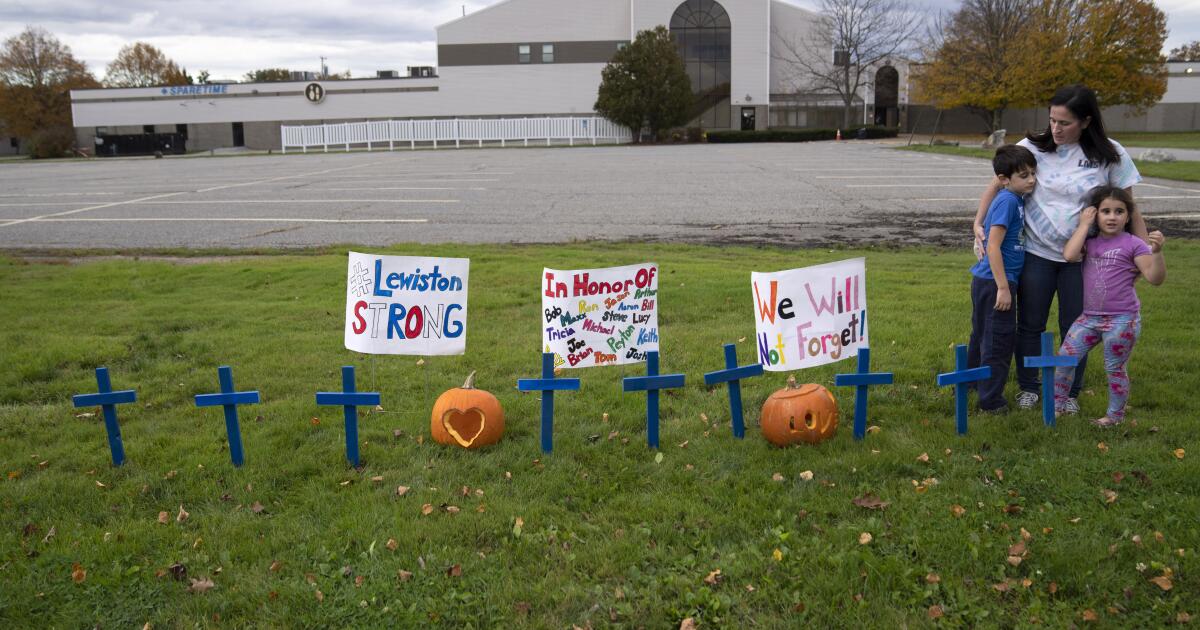The disturbed gunman who killed 18 people and wounded 13 others in Lewiston, Maine, probably could not have committed his mass shooting in California. That’s because our “red flag” law surely would have prevented the massacre.
This is the opinion of state Atty. Gen. Rob Bonta and UC firearms researcher Garen Wintemute. Their reasoning makes sense.
California’s red flag law enables family members, domestic partners, fearful exes, co-workers and teachers to report someone who’s acting scary — maybe threatening to shoot up a place. Cops will investigate and a judge can order the person’s guns confiscated.
But the law is underused. Many people are naturally reluctant to “get involved.” They’re often scared of riling a brute. Law enforcement agencies also may not want to bother, thinking it’s too much trouble. They’re already overburdened. Some may even disagree with the notion of seizing a guy’s guns.
We need more trained law enforcement officers to confiscate firearms from people deemed too dangerous to possess them. That would require the governor and Legislature to appropriate a lot more money for the potentially perilous task.
But it would be an excellent use of tax dollars that saved lives.
The Maine shooter was “a poster child” for use of the red flag law, says Wintemute, director of the UC Firearms Violence Research Program.
“We pioneered it in California. It’s specifically intended for crises like this. It’s much less likely this [mass shooting] would have happened in California.”
Bonta goes even further.
“In California, this tragedy wouldn’t have happened,” the attorney general says flatly. “It would have been easy to seek a Gun Violence Restraining Order under the red flag law.”
Conditions were certainly ripe for that in Maine. The shooter was practically crying out for help.
Several states have some version of a red flag law. But not Maine, a sparsely populated state with a hunting culture where guns are frequently part of the family. Maine has a “yellow flag” law, the only one in the country.
The yellow flag is much more cumbersome than California’s red flag. There are more hoops that are difficult to go through before a scary guy’s guns can be seized.
In Maine, a local law enforcement agency must take a person into custody and order a mental health evaluation before a judge can be asked to temporarily remove his guns. In California, there’s neither a requirement for arrest nor a mental health exam. The person’s actions and words speak for themselves.
“We balance due process and rights of the individual with safety of the community,” Bonta says. “A judge determines.”
Robert Card, 40, the Maine shooter who ultimately killed himself, was in the Army reserve. He began acting erratically over the summer, telling people he had been “hearing voices” and accusing fellow reservists of calling him a pedophile. He shoved one of them. State police took him to a psychiatric hospital where he spent two weeks.
Afterward, Card threatened to shoot up an Army reserve drill center.
“This guy did everything short of taking out a front-page ad in the newspaper saying he was going to commit an atrocity,” said Mark Collins, a policy director at Brady, a gun violence prevention organization.
Two sheriff’s deputies went to Card’s trailer in mid-September. His car was there and the officers heard someone moving around inside the trailer. But no one answered the door. They left.
Deputies didn’t have legal authority to press the case if Card didn’t want to open the door, the local sheriff later told reporters. The case was basically dropped.
On Oct. 25, Card shot up a bowling alley and a nearby restaurant and bar, killing and maiming.
In California, the red flag law has prevented at least 58 mass shootings in the last three years, according to UC Davis researchers. In 80% of cases, they reported, mass shooters tell family members or friends of their evil intentions in advance. Or they blab it on social media. That’s when the red flag law can be triggered.
California also has another gun-seizing program that is the only one like it in the nation, according to Bonta’s Department of Justice.
Under it, state officers can raid the residence of someone legally prohibited from possessing guns and confiscate his firearms. These prohibited persons include people convicted of a felony or violent misdemeanor, or who have a domestic violence restraining order or suffer from serious mental illness.
Last year, the state collected 1,427 such firearms — a relative handful compared with the illegal arsenals undoubtedly out there.
Seizing guns from dangerous guys under both the local red flag law and state program is risky for deputies. It’s not a solo job. Perhaps a half dozen armed officers are needed. It’s not an appealing position to recruit for.
“This is tough,” Wintemute says. “Somebody is in a crisis. He’s got guns. And somebody else has to try to take them away. But just because it’s hard doesn’t mean we leave it alone. There are lives at stake.”
Last year, Gov. Gavin Newsom and the Legislature approved $40 million to help enforce the red flag law, particularly in domestic violence cases. Relatively little money spent well.
California’s red flag law won’t prevent all mass shootings. This is gun-addicted America, after all. We’re submerged in deadly toys.
But because of California’s strict gun controls, we’ll continue to have proportionally fewer firearms deaths than the rest of America. And our bowling alleys and bars will be safer than in other states.
This story originally appeared on LA Times

